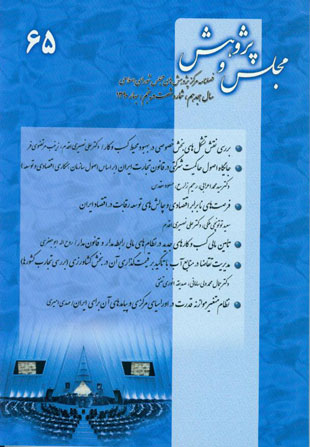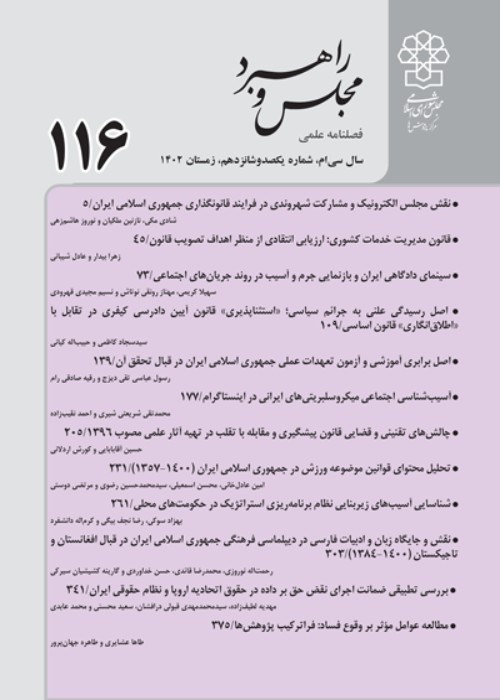فهرست مطالب

فصلنامه مجلس و راهبرد
پیاپی 65 (بهار 1390)
- تاریخ انتشار: 1390/09/05
- تعداد عناوین: 6
-
Page 9One of the problems of economic policy and decision making is the remoteness of Decision maker's intellectual space and those decisions are imposed on them. So we have often seen that business owners have protested against the decisions have been taken by the government and parliament and retention of policies that hours had been spent to survey them.Experiences of many countries show that the private sector could have affected the government policies and business environment through business associations. Today, private sector associations in different countries as well as the government and market are considered the pillars of development. These associations play major roles in decision-making process and they are surveyed by governments and their knowledge and interests are regarded in government's policies before adoption of regulations.The paper shows associations roles in the improvement of business environment through reviewing international experiences of the government and private sector interaction. In this study, the main points are discussed as follows:1. What positive and negative functions are there for economic organizations theoretically?2. What positive and negative functions have been shown by domestic and foreign economic organizations in practice?3. Given the theoretical principles and practical experiences, what roles can be defined for economic organizations to improve the business environment and how can the government use the capacity of these associations?Keywords: The Improvement of Business Environment, Business Associations of Private Sector, The Government
-
Page 37This paper is a description of qualitative content analysis which based on the principles of corporate governance of OECD to study Iran Trade Law–as the main official source of corporate governance in Iran. The method is described according to Articles of corporate governance extracted from Iran Trade Law and conforming to OECD principles. Results of the analysis show that the corporate governance principles of trade law are insufficient in following areas: the failure and the lack of effective framework for the protection of small shareholder's rights, lack of an effective framework for internal control and efficient inspection, no separation of board chairman and OEC roles; no separation of auditor and inspector legal of the corporation; lack of proper disclosure and transparency measures taken, and other shareholder's rights arent observed.Keywords: Corporate Governance, Iran Trade Law, OECD (Organization for Economic Cooperation, Development) Principles
-
Page 67Competition is one of the best and most efficient mechanisms to allocate resources.In classical economics, competition refers to the situation in which all actors should be priced and the one can not affect the relative prices. This concept implies that in order to the competition governance and efficient allocation of resources, relative prices and costs of the activity should be the same for all actors. Laws and regulations governing economic system is one of the main elements constituting relative prices. If a country's legal system has the privileges to some of the actors but others, the principle f "equal relative prices" or "price flexibility" will be disrupted and the competition will be undermined.The hypothesis of this article is that the current rules and regulations are discriminatory against relative prices for economic activists and therefore it is one of the reasons for failure to establish competitive markets and efficient allocation of resources in Iranian economy.Results of the empirical study in the field of Tax Law, Cooperative Economics Law, Law on Tendering, and Administration of the Free Zones Act confirm the hypothesis of this article.Keywords: Competition, Monopoly, Relative Price, Article (44) of the Constitution
-
Page 105One of the major classifications of the economy is division into the real and financial sectors. Being at service of financial sector than the real sector of economy is the basic principles of this classification.Financial systems are usually known with financial markets,institutions, and instruments that they are working on financial laws.What the real economy and financial sector developments in the late decades of the twentieth century and early twenty-first century is such that coordinating these two sectors is considered as one of the main concerns of economic policy makers. Path of economic growth from agriculture to industry-based economy and now towards the knowledge-based economy will require financial institutions provide financial services to facilitate such activities appropriately. Policy makers acknowledged Iran's economy has taken step toward the development of knowledge-based economy in the implementation of the fourth and fifth five-year development plans.Financial systems are divided into two systems: relationshiporiented (Bank-Oriented) and rule-based (stock-based). Due to the legal and cultural economic infrastructures, optimal combination of these two systems is required the financial systems to perform their own duties better than the real sector of the economy. The paper explains the relationship between the real and financial sectors of the economy and describes financial sector duties and shows that relationship-oriented and rule-bused financial systems have responded to the question of financing new businesses separately. Venture capital funds are the main entity of rule-based systems but we see the majorrole of development banks in the relationship-oriented financial systems.Keywords: Financial System, Bank, oriented, Stock, based, Development Bank, Venture Capital Funds (VC)
-
Page 135In recent years, rare and limited access to water in agriculture as a part of the largest consumer water in the world has shown itself more and for this reason that in the late twentieth century, the need to manage this resource as an economic commodity has been emphasized and taken into consideration in international negotiations including the Rio Summit. Given the importance of water resources management,knowledge management approaches in this field can be regarded as an important step towards better performance. This paper aims to introduce and evaluate the conventional techniques in agricultural water pricing and also enumerating benefits from the implementation of this policy with the explanation of different countrie's experiences in this field. In this regard, demand management of water resources and the tools are introduced then, some empirical approaches to water pricing explained. In the study of relevant researches in Iran and other countries, effects, possible benefits, and requirements for the implementation of this policy has been summed up. Research in the field of agricultural water pricing revealed however correct pricing of water as one of the important pillars in the demand water management can save some water, the savings rate and other pricing issues depend on the organizational, economic, and regional conditions largely that elasticity of demand or inelasticity of demand will be followed for applicants. Among water resources pricing methods, empirical pricing methods (non-volumetric methods) are more used in Iran. Also several research studies showed that in the pricing of water resources, more researches were on the percentage increase in the current water tariffs on demand.Keywords: Demand Management, Water Pricing, Elasticity of Demand (Elastic Behavior), Agricultural Sector
-
Page 167Revolution in Kyrgyzstan Republic and fall of the government raised from the color revolution has been drawn attentions to the Central Asia and Caucasus regions (Central Eurasia) again. Apart from the root and internal effects, the development can be examined- that has direct feedback on the prevailing balance of power in Central Eurasia and adds to the volatility and fluidity of the system- by a prevailing systematic developments framework in these regions. Recent developments in Central Eurasia region is initiated from continuing erosion of western actor's situation and increasing traditional and regional actor's roles and influences of this region which in turn impacted greatly on Iranian interests in the region.Keywords: Balance of Power, Central Eurasia, Central Asia, Caucasus, America, Russia, Iran


